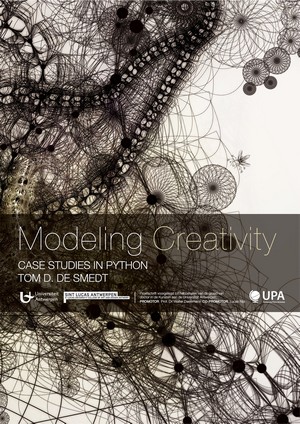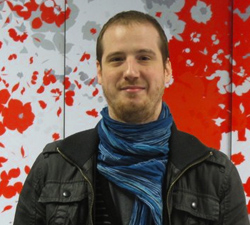
Modeling Creativity - Case Studies in Python
In this doctoral thesis, Tom De Smedt aims to construct computer models that exhibit creativity in an artistic context, that is, that are capable of generating or evaluating an artwork (visual or linguistic).
Tag(s): Artificial Intelligence Python
Publication date: 01 Jan 2013
ISBN-10: 9057182602
ISBN-13: 9789057182600
Paperback: 168 pages
Views: 11,246
Modeling Creativity - Case Studies in Python
 In this doctoral thesis, Tom De Smedt aims to construct computer models that exhibit creativity in an artistic context, that is, that are capable of generating or evaluating an artwork (visual or linguistic).
In this doctoral thesis, Tom De Smedt aims to construct computer models that exhibit creativity in an artistic context, that is, that are capable of generating or evaluating an artwork (visual or linguistic).
Publication date: 01 Jan 2013
ISBN-10: 9057182602
ISBN-13: 9789057182600
Paperback: 168 pages
Views: 11,246
Document Type: N/A
Publisher: University Press Antwerp
License: n/a
Post time: 25 May 2016 10:00:00
Tom de Smedt wrote:The topic of this work is to model creativity using computational approaches. Our aim is to construct computer models that exhibit creativity in an artistic context, that is, that are capable of generating or evaluating an artwork (visual or linguistic), an interesting new idea, a subjective opinion. The research was conducted in 2008–2012 at the Computational Linguistics Research Group (CLiPS, University of Antwerp) under the supervision of Prof. Walter Daelemans. Prior research was also conducted at the Experimental Media Research Group (EMRG, St. Lucas University College of Art & Design Antwerp) under the supervision of Lucas Nijs. Early research focuses on generative art.
Table of Contents:
Blind creativity - Generative art - Brain-computer interfaces - Human creativity - Computational creativity - Computational linguistics - Sentiment Analysis
Tweet
About The Author(s)
Tom De Smedt is an artist and a software engineer. He is affiliated with the Computational Linguistics Group (CLiPS, University of Antwerp, BE) as postdoctoral researcher, co-founder of the Experimental Media Research Group, and invited artist at IMEC (Interuniversity Microelectronics Centre, Leuven, BE). His research interests include computational creativity, computational linguistics, machine learning and cognition.

Tom De Smedt is an artist and a software engineer. He is affiliated with the Computational Linguistics Group (CLiPS, University of Antwerp, BE) as postdoctoral researcher, co-founder of the Experimental Media Research Group, and invited artist at IMEC (Interuniversity Microelectronics Centre, Leuven, BE). His research interests include computational creativity, computational linguistics, machine learning and cognition.